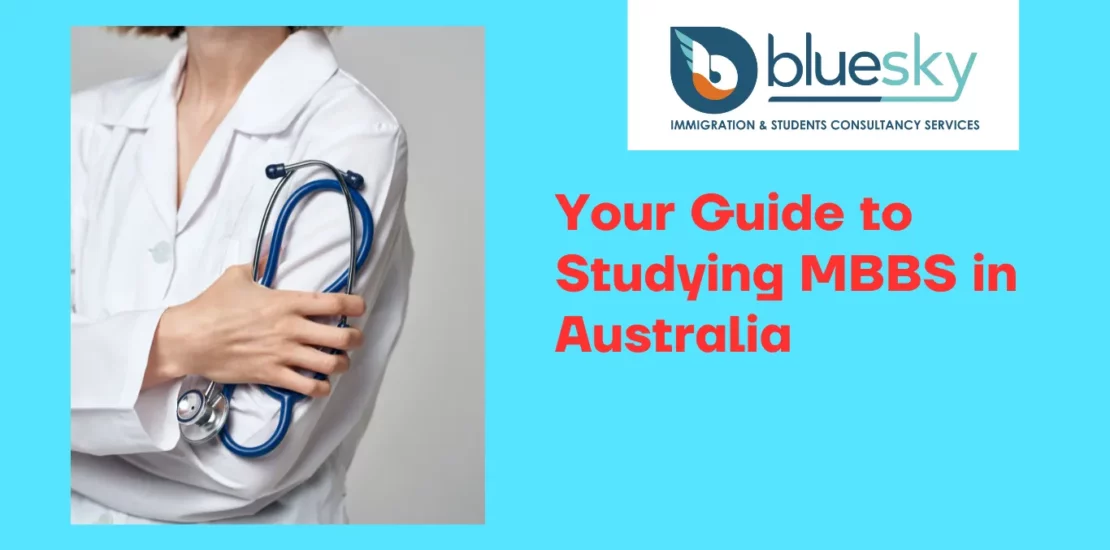Chasing the Dream in Australia: Your Guide to Studying MBBS in Australia
- February 22, 2024
- Posted by: Sandeep
- Categories: Study Abroad, Study in Australia

Harnessing a passion for medicine and yearning for an enriching academic adventure? Consider studying MBBS (Bachelor of Medicine and Bachelor of Surgery) in Australia, a land renowned for its world-class medical education, vibrant multicultural landscape, and stunning natural beauty. This comprehensive guide delves into everything you need to know about embarking on this exciting journey, from eligibility requirements to program structure, visa processes, and career prospects.
Why Choose Australia for Study MBBS ?
- Globally Recognized Degrees: Australian universities boast globally recognized MBBS degrees, accredited by the Australian Medical Council (AMC). These qualifications equip you to practice medicine in Australia and many other countries, opening doors to diverse career paths.
- High-Quality Education: Australian medical schools prioritize innovative teaching methods, interactive learning environments, and clinical exposure, ensuring you graduate with a strong foundation in medical knowledge and practical skills.
- Research Powerhouse: Australia is a global leader in medical research, offering exceptional opportunities to participate in cutting-edge projects and contribute to advancing healthcare knowledge.
- Multicultural Haven: Embrace diversity and cultural richness as you interact with fellow students and faculty from around the world. Australia fosters an inclusive and welcoming environment for international students.
- Breathtaking Landscapes: Beyond academics, indulge in Australia’s breathtaking natural wonders. From the iconic beaches and rainforests to the majestic outback, explore the diverse landscapes and create unforgettable memories.
Eligibility Requirements for MBBS in Australia:
- Strong Academic Background: Possess excellent academic performance in high school, particularly in science and math subjects. Specific requirements vary by university, so research individual programs carefully.
- English Language Proficiency: Demonstrate English language proficiency through standardized tests like IELTS or TOEFL, meeting the minimum score requirements set by the university.
- Medical Entrance Exams: Some universities may require you to take entrance exams like GAMSAT (Graduate Australian Medical School Admissions Test) or MCAT (Medical College Admission Test).
MBBS Program Structure:
- Duration: The MBBS program typically lasts 6 years, divided into pre-clinical and clinical phases.
- Pre-clinical Phase: This phase focuses on foundational medical sciences like anatomy, physiology, biochemistry, and pharmacology. You’ll gain a strong theoretical understanding of the human body and its functions.
- Clinical Phase: During this phase, you’ll transition from theory to practice, participating in clinical rotations in various specialties like internal medicine, surgery, pediatrics, and obstetrics & gynecology. You’ll hone your clinical skills under the guidance of experienced doctors and gain valuable hands-on experience.
How much does it cost to study mbbs in australia
- Tuition fees: AUD$53,000 to AUD$77,000 per year (approx. US$38,000 to US$55,000)
- Living expenses: AUD$20,000 to AUD$35,000 per year (approx. US$14,000 to US$25,000)
- Other costs: AUD$5,000 to AUD$10,000 per year (approx. US$3,500 to US$7,000)
Total cost: AUD$288,000 to AUD$495,000 for the entire program (approx. US$206,000 to US$356,000)
Visa Process for MBBS in Australia:
- Apply for a Student Visa (Subclass 500): This visa allows you to study full-time in Australia for the duration of your MBBS program. You’ll need to meet specific requirements, including having sufficient financial resources, health insurance, and genuine temporary entrant status.
- Seek Professional Guidance: Consider consulting an immigration lawyer specializing in student visas for expert advice and assistance throughout the visa application process.
Contact for free consultation with expert
Financial Considerations for MBBS in Australia:
- Tuition Fees: Be prepared for higher tuition fees compared to some other countries. Research individual university fees and explore scholarship opportunities to help manage costs.
- Living Expenses: Factor in living expenses like accommodation, food, transportation, and healthcare when budgeting for your studies.
Career Prospects:
- High Demand: Doctors are in high demand in Australia, offering graduates excellent employment opportunities. You can choose to specialize in a particular field or pursue a career in general practice.
- Global Opportunities: With a globally recognized degree, you can explore career options in other countries, expanding your professional horizons.
- Competitive Salaries: Doctors in Australia enjoy competitive salaries and excellent job security, making it a rewarding career choice.
Top Cities for Studying MBBS in Australia: Melbourne, Sydney, Adelaide
Australia’s reputation for world-class medical education makes it a sought-after destination for aspiring doctors. If you’re considering an MBBS program Down Under, these three vibrant cities offer excellent options:
| University | City | Program Duration | Key Strengths |
|---|---|---|---|
| University of Melbourne | Melbourne | 6 years | Research-focused, innovative curriculum, world-renowned reputation |
| Monash University | Melbourne | 6 years | Largest medical school in Australia, strong clinical skills development |
| Swinburne University of Technology | Melbourne | 6 years | Patient-centered care, early clinical placements |
| The University of Sydney | Sydney | 6 years | Long history of excellence, diverse clinical settings |
| University of New South Wales (UNSW Sydney) | Sydney | 6 years | Strong academic foundation, early clinical exposure |
| Western Sydney University | Sydney | 6 years | Community engagement, rural healthcare focus |
| The University of Adelaide | Adelaide | 6 years | Research and innovation focus |
| Flinders University | Adelaide | 5 years | Supportive learning environment, rural healthcare focus |
Disclaimer:
The information contained on this blog post is for informational purposes only and is not intended to be a substitute for professional advice. And the information provided on this blog should not be construed as professional advice.
While I strive to provide accurate and up-to-date information, I cannot guarantee that all information is complete or error-free. You should always consult with a qualified professional before making any decisions based on the information contained on this blog post.
